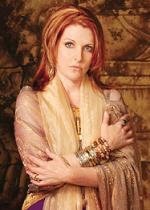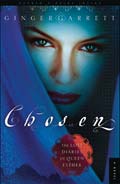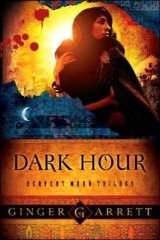
It is October 1st, time for the FIRST Day Blog Tour! (Join our
alliance! Click the button!) The FIRST day of every month we will feature an
author and their latest book's FIRST chapter!
This month's feature author is:
GINGER
GARRETT
Guess what? You can win a free copy of Dark
Hour! Just leave a comment on this post and I will pick the winner from a random draw on Saturday 07 October!
About the author:
Ginger Garrett is an acclaimed
novelist and expert in ancient women's history.
 Her first novel, Chosen, was
Her first novel, Chosen, was
recognized as one of the best five novels of the year by the Christian
publishing industry. Ginger enjoys a diverse reader base and creates
conversation between cultures.
In addition to her 2006 and 2007
novels about the most evil women in biblical history, she will release
Beauty Secrets of the Bible (published by Thomas Nelson) in Summer
2007.
Ginger Garrett's Dark Hour
delves into the biblical account of Jezebel's daughter and her attempt to
end the line of David.
 And now, a
And now, a
special Q&A with Ginger Garrett:
1.) First, tell us a bit about Dark Hour.
I was praying about what book to write after Chosen, and accidentally
left my open Bible on the kitchen table. (A dangerous thing, since in my
house, small children and large dogs routinely scavenge with dirty
hands and noses for snacks!) As I walked past it, I saw a caption about
someone named Athaliah and a mass murder. I stopped cold. I knew it was my
story.
Athaliah was the daughter of Jezebel--a real woman in
history--who tried to destroy all the descendents of King David in a
massacre. God made a promise that a descendent of King David would always sit
on the throne, and one day a Messiah would come from this line. If
Athaliah succeeded, she would break the promise between God and the people,
and destroy all hope for a Messiah.
One woman, her step-daughter, Jehoshebeth, defied her. She stole a baby
during the massacre and hid him. Between them, the two women literally
fought for the fate of the world.
2.)
What drew you to write biblical fiction? The similarities between the lives of ancient women and our lives. We
get distracted by their "packaging," the way they dressed and lived, but
at heart, our stories are parallel.
3.)
How much time is spent researching the novel versus writing the
novel?

Equal amounts, and I don't stop researching while I write. I have a
historical expert, probably the best in the world in his field, review the
manuscript and point out errors. The tough part is deciding when to
ignore his advice. He pointed out that most everyone rode donkeys if they
weren't in the military, but a key scene in the novel involves riding a
horse to the rescue. It would have been anti-climatic to charge in on a
donkey! :) So I ignored his advice on that one.
4.)
Dark Hour takes its reader deep into the heart of palace
intrigue and betrayals. Were parts of this book difficult to write?
I left out much of the darkest material I uncovered in research. It was
important to show how violent and treacherous these times and this
woman (Athaliah) could be, but I tried to be cautious about how to do it.
The story was so powerful and hopeful--how one woman's courage in the
face of evil saved the world--but the evil was depressing. I tried to
move quickly past it. I wanted balance. Our heroine suffers and some
wounds are not completely healed in her lifetime. That's true for us, too.
5.)
What would modern readers find surprising about ancient
women?They had a powerful sense of the community of women. They also wore
make-up: blush, glitter eyeshadow, lipstick, powder, and perfume! They
drank beer with straws, and enjoyed "Fritos": ground grains, fried and
salted. Many of our foods are the same today, but they loved to serve pate
made from dried locusts, finely ground. Ugh!
 Without further
Without further
ado...here is the FIRST chapter of
Dark Hour by
Ginger Garrett. Judge for yourself if you'd like to read more!
(There is a prologue before chapter one regarding the birth of
Jehoshebeth... Athaliah is not Jehoshebeth's biological mother.)
c h a p t e r O n e
Fifteen Years Later
HER BARU, the priest of divination, opened the goatskin bag and
spread the wet liver along the floor, leaving a path of blood as he
worked. Retrieving a wooden board and pegs from his other satchel, the
satchel that held the knives and charms, he placed pegs in the board
according to where the liver was marked by fat and disease. He turned the
black liver over, revealing a ragged abscess.
Athaliah covered her mouth and nose with her hands to ward off
the smell but would not turn way.
“Worms,” her sorcerer said, not looking up. He placed more pegs
in the board before he stopped, and his breath caught.
A freezing wind touched them, though they were in the heart of
the palace in the heat of the afternoon. Athaliah cursed this cold thing
that had found her again and watched the sorcerer search for the source
of the chill before he returned to the divination. There was no source
of wind here; in her chamber there was a bed, the table where her
servants applied her cosmetics from ornate and lovely jars shaped like
animals, a limestone toilet, and in the farthest corner so that no one at
the chamber door would see it, her shrine. Statues of Baal, the storm
god, and the great goddess Asherah, who called all life into being, stood
among the panting lions carved from ivory and the oil lamps that burned
at all hours. Here she placed her offerings of incense and oil, and
here she whispered to the icy thing as it worshiped alongside her.
The baru watched as the flames in the shrine swayed, the chill
moving among the gods. The flames stayed at an angle until one began to
burn the face of Asherah. Her painted face began to melt, first her
eyes running black and then her mouth flowing red. He gasped and stood.
“I must return to the city.”
Athaliah stood, blocking him from his satchel.
“What does the liver say?”
“It is not good that I have come. We will work another day.”
She did not move. He glanced at the door. Guards with sharp
swords were posted outside.
“A dead king still rules here. You set yourself against him
and are damned.”
Athaliah sighed. “You speak of David.”
The baru nodded and bent closer so no other thing would hear his
whisper. “There is a prophecy about him, that one from the house of
David will always reign in Judah. His light will never die.”
“I fear no man, dead or living.”
The baru continued to whisper, fear pushing into his eyes,
making them wide. “It is not the man you must fear. It is his God.”
Athaliah bit her lip and considered his words. She wished he
didn’t tremble. It was such a burden to comfort a man.
“Yes, this God. It is this God who troubles us. Perhaps I can
make an offering to Him. You must instruct me. Stay, my friend, stay.”
She patted him on the arm, detesting his clammy flesh. “I have dreamed,”
she confessed. “I have a message from this God, and I must know how to
answer Him.”
The baru took a step back, shaking his head. “What is this
dream?”
“A man,” Athaliah said.
“Tell me.”
“At night, when I sleep and the moon blankets my chamber, I see
a man. He is not as we are: he is coarse and wild. He wears skins hewn
from savage beasts, run round his waist with careless thought, and in
his mind he is always running, ax in hand, running. I feel his thoughts,
his mind churning with unrest, and he knows mine completely. I hear a
burning whisper from heaven and shut up my ears, but he turns to the
sound. A great hand touches him, sealing him for what lies ahead, and
speaks a name I cannot hear, a calling to one yet to be. I try to strike
this man, but all goes red, blankets of red washing down.”
She licked her lips and waited, breathing hard. The baru nodded.
“You see the prophet of Yahweh, Elijah, who plagues your
mother.”
The baru began to reach for his goatskin sack. He picked up the
liver and put it in the sack, keeping an eye on the door as he wiped
his bloody hand on his robes. She knew he was measuring his steps in his
mind, thinking only of freedom from here, and from her.
Athaliah grabbed his arm. “I let those who worship Yahweh
live in peace. They mean nothing to me; what is one God in a
land of so many? Why would this God send a man to make war
on my mother and then claim me also?”
The baru narrowed his eyes. “This God is not like the others.”
“How can we be free of Him?”
The baru thought for a moment then reached into his satchel. He
pulled out a handful of teeth and tossed them on the ground at her
feet. She did not move.
He squatted and read them, probing them with a shaking finger.
She watched as the hair along his neck rose, and goose bumps popped all
along his skin. The cold thing had wrapped itself tightly around him.
She could see his breath.
“There is a child,” he said. “The eye of Yahweh is upon this
child, always. I must counsel you to find this child and kill it, for when
it is gone, Yahweh would trouble you no more.”
Athaliah murmured and ran her teeth over her lips, biting and
dragging the skin as her thoughts worked back in time. “It is my daughter
you speak of. Only a girl. But even so, I cannot kill her yet. I would
lose my rights as the most favored wife. I will not risk my crown for
so small a prize. No, I will find another way to get rid of her, and I
will deal with this threat from Yahweh as I must.”
Athaliah walked to her shrine and cleaned the face of Asherah.
She could hear the baru scooping the teeth back into the bag. She turned
with a sly smile, pleased that her mind worked so quickly even with the
cold thing so near.
“My mother has already angered this God. We will let her have
our problem. She has a talent for these things.”
He had finished putting everything back into his two sacks and
edged toward the door. She wondered if he would return. He was the best
she had at divining dreams and saw in the liver so many answers. She
sighed and tried to think of a word to reassure him.
“A farmer may own the field,” she began, “but much work is done
before a harvest is even planted. Stones are removed, weeds are torn
free. We must break loose the soil and uproot our enemies so the field
will be ready. On that day I will sow richly.”
He managed a weak smile.
“Let your appetite grow, my friend,” she coaxed. “The harvest is
coming.”
He fled so quickly she knew her words had been wasted, as all
words were on frightened men. He would never return.
***
PRINCE JEHORAM nursed a
silver bowl of dark wine and wished the business of inheriting a kingdom
did not involve so much listening. He rubbed his beard, its thick
clinging brown curls now flecked with gray. His beard was weathering his age
better than the hair on his head, he realized, which had already
surrendered to the assault of time, great gray streaks overtaking the brown.
He knew his face was kind, though, not hardened or roughened by his
years, but retaining a boyish appeal in his wry mouth and a small scar
just under his left eye. Any woman could look upon him and see the child
of mischief he once was. All women looked upon him and still thought to
correct him.
He dined in a dim, private room with his advisers. The room was
adjacent to the throne room, where he would one day rule, and was bare,
save for an oil lamp on a low table. Cedar beams topped the limestone
walls, giving the palace a sweet, smoky scent under the afternoon sun.
The men sat around the table, scattered with maps, sharing a lunch of
grapes, bread, wine, and cheese. Normally they would eat more, and in the
dining hall, but the kitchen servants were busy preparing for the great
send-off feast and it was easier to be served here.
Tomorrow, his father, King Jehoshaphat, would lead Judah’s army
north toward Israel and King Ahab. Together, the two kingdoms would
fight their inconstant friend Ben-Hadad to end his trade monopolies.
Ben-Hadad fought alongside them against the cruel Assyrians but turned often
and claimed the richest of trade cities for himself.
“There are implications, my prince,” Ethan said. Ethan was the
tallest, and his skin turned red when he was angry, which was often. His
temper had plagued him since he and the prince were boys, but now
Jehoram no longer found pleasure in goading his friend. “If the kings
succeed at Ramoth-Gilead against Ben-Hadad,” Ethan continued, “and the
proposed alliance is
accepted, your father will have obligations both to the north and
south. In this way, Ahab’s kingdom will be strengthened by this victory, and
your own kingdom will be compromised. Judah may weaken and fall at last
to a king of Israel.”
“I have married the daughter of Ahab,” Jehoram replied. “I have
given their daughter an heir and promised her the crown. I have curried
the favor of the north well enough. They will not turn on me, for their
own daughter is at my side.” He tried to entertain himself with the
food and wine while his advisers prattled on. He wondered what would be
served at the feast tonight. If the servants’ exhausted expressions were
any indication, the spread would be remarkable.
“That is true, my friend,” Ethan said. “But you are wrong to
think this is Ahab’s war. It is a woman who is shaping this new world.
Think on this: What does the powerful Jezebel desire more than to bring
glory to her own name? She wants the north and south reunited so that she
may one day rule them both, a queen equal in power to Solomon.”
Ethan smirked as he continued. “Everyone knows Ahab wears the
crown but Jezebel rules. With Ahab and Jehoshaphat together in battle,
their voices silenced for a time, Jezebel will be listening for yours.
Let her know a lion roars in Judah. We will never be ruled by a woman,
especially one who hides behind her husband’s crown.”
Jehoram listened, running his tongue across his lips, catching a
spot of wine resting just above his lip. Ethan was his truest friend,
if a man about to wear the crown had one, but he was always ready for a
fight. Jehoram preferred to suffer a blow and stay with his women and
wine. He sighed. “Ethan, you look into darkness and see monsters, but I
see only shadows. It has always been this way.”
Ethan frowned. “We are no longer children hunting with our
fathers at night. Listen to me, for I am the voice of God in your ear.”
Jehoram turned his face away and crossed his arms. Then he
sighed and reached for a bowl of grapes and began to eat. He did not like an
empty stomach.
Another adviser bit into some cheese and leaned in. “Mighty
Ethan is right. Jezebel wants to see you on the throne because of your
union with her daughter Athaliah, but she is no ally. Listen to what I tell
you: Something evil here stirs the water and watches.”
“These voices of doom!” Jehoram yelled, slapping his bowl down
on the table so that it spilled. “These voices and whispers, will they
not cease?” He gripped his head and glared at the men. Each had but one
wife and thought to advise him on his many? “You warn me against women,
even my own wife, but they are women and nothing more!”
Ethan scooted closer to him. “Do not play the fool. Athaliah
practices her strange magic and you slip under her spell little by little.
There is still time to save yourself, and the kingdom, if you are
indeed a man and king.”
Jehoram rose and adjusted his robe around his shoulders, staring
down at Ethan.
“Do even my friends turn against me now?” he asked.
“I have always been like a brother to you. I desire nothing but
your good,” Ethan said, rising. Jehoram held his temper and the two men
glared at each other, breathing hard.
The adviser Ornat spoke. “May I address the future king of
Judah?”
Jehoram nodded and sat, returning to his grapes. He glanced at
Ethan and shook his head.
Ornat was new to his inner circle, an adviser Athaliah had
recommended for his influence among the people who did not worship the God
of Judah. She promised his voice would balance the harsh messages the
others always gave. He had long, straight gray hair that always hung as
if he had just come in from the rain. A magnificent bump crowned his
nose, but it was the only remarkable feature about the man, a man who
looked as if he were melting before their eyes.
“Good Jehoram,” Ornat began, “the king knows you are a son who
is not like the father. King Jehoshaphat has conspired with your
brothers to ensure you never take the throne. They plot behind closed doors,
taking their meals without you. I have heard the plans from my spies
among the servants.”
Jehoram felt his stomach churn at the accusation. He would not
allow such ridiculous talk and raised his hand to dismiss the man at
once.
The arrival of Athaliah interrupted them, and all bowed as she
entered.
“Jehoram, I seek your face with a burden on my heart. Hear me
and help me, my lord and husband,” she said.
Jehoram looked at her a moment, his eyes having trouble
adjusting to the light that streamed in when the door had opened. She stirred
something in him, as she had from her first night in the palace,
rain-soaked and announced by thunder, her sheer robes clinging to her tiny
frame. She came bearing boxes of shrines and gods, like the dolls of a
child, and she clung to them even in their bedchamber. She was the only
wife who did not submit to his will, and he had found her exotic. Now she
had grown, but his exotic pet was still wild, shaking off the customs
and manners he tried to teach her. He knew she hungered, but not for
him. His face burned with shame.
“Speak, Athaliah,” he said.
“Your daughter has grown quite pale of late. I have seen this
sickness before.”
Jehoram sat up straight. Sickness in the palace would spread
rapidly, a threat as swift and fierce as any Assyrian.
“What sickness?” he demanded.
Athaliah smiled at him, then at the men reclining.
“Of course you do not understand,” she said. “You are men. You
have tended your kingdom well but neglected to see that your daughter
has come of age.”
Jehoram exhaled and sat back, an indulgent smile on his lips.
“And what remedy does this sickness crave?” he asked.
Athaliah bowed before Jehoram. “She must marry, my lord.”
Jehoram waved his hand, a broad gesture. Here he could be
master.
“I command, then, that she be married. If there is a commander
well thought of, it would be an honor to give a daughter in marriage
just before a battle.”
Athaliah nodded, just once. He felt his victory slipping away.
“I have sent word to the north,” Athaliah said, “to my mother’s
house, that a nobleman from my own home who serves in the ivory palace
of my mother be given her. King Ahab has sent you his favorite
daughter.” She smiled. “Now let us send ours to him. It will be good for
Jehoshebeth to hold your name ever before my father, Ahab. And Jezebel would
relish a granddaughter so near.”
Jehoram stopped and frowned. “It is Jehoshebeth you speak of?
She is a special child to me. I would not have her sent north.”
“But you have given the order that she be married. There is no
one else worthy of her,” Athaliah said.
Jehoram rubbed his chin and pretended to study a map. Finally,
he shook his head. “I must think on this.”
Athaliah bowed low, her eyes closed. “May the God you serve
bless all your decisions, good Jehoram,” she said. She straightened and
looked at the advisers. Jehoram could not bear to see their eyes upon his
bride, the only territory he owned and could not rule. He detected
secrets moving between her and Ornat like a sudden spring bubbling up from
a dark source. Only a few found it distasteful and turned away. Ethan
was the first to scowl and return his glance to the prince.
“I will see you all at the feast tonight,” Athaliah said as she
left.
She wagged a finger at Ornat. “Take care of my good husband.”
Jehoram slouched in his seat and returned to his grapes.













